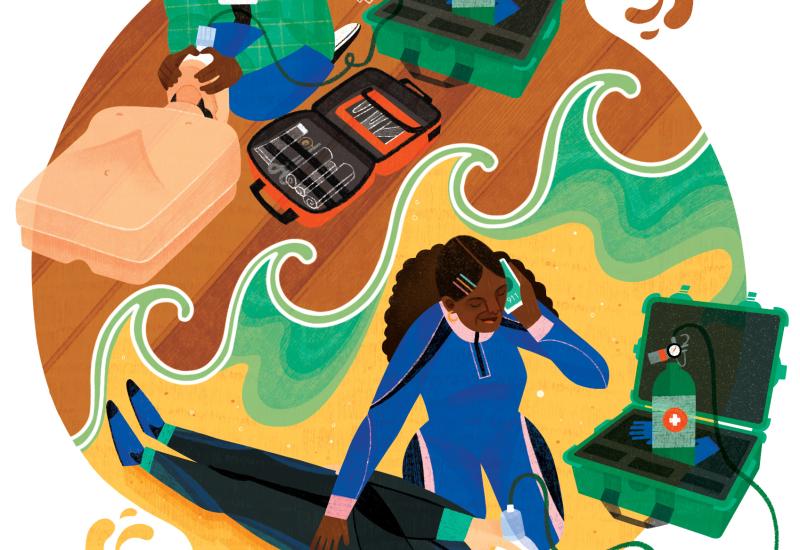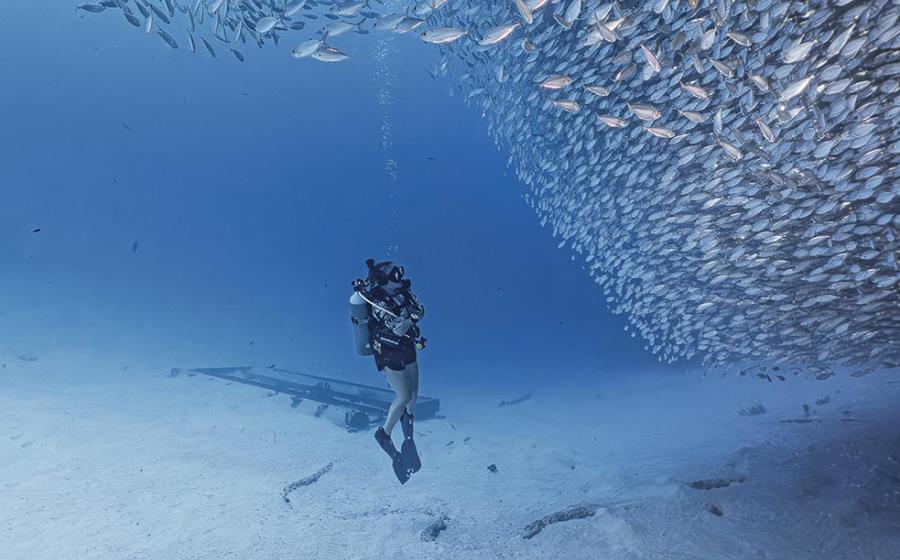Ask An Expert: Is Shark Week Good for Sharks?

AAE Shark Week opener
Thinkstock
Is Shark Week Good for Sharks?
Discovery Channel's Shark Week 2011 starts Sunday, July 31st
Shark Week is entertainment by exploitation By Chris Palmer
Chris Palmer is the director of American university’s Center for Environmental Filmmaking and author of the new Sierra Club book, Shooting in the Wild: An Insider’s Account of Making Movies in the Animal Kingdom.
Teeth of Death. The Worst Shark Attack Ever.
It’s that time of year again, when the Discovery Channel brings out shows like these as part of its annual Shark Week. This week of bloody feeding frenzies and vicious shark attacks is part of a larger trend in nature programming. Instead of seeking to educate or promote environmental conservation, these shows focus only on presenting graphic, sensationalized animal violence. While they might garner high ratings and attract advertiser dollars, these shows all too often mislead the audience, exploit animals and fail to promote conservation.

It’s easy to understand why Shark Week would attract viewers. The subject matter is riveting, the editing is flashy, and the shows are thrilling and suspenseful. This brand of mayhem and mutilation has an eager audience and has turned the nature-film genre into an entertainment juggernaut. However, even worse than these programs’ shameless appeals to the viewer’s basest instincts is their impact on the wildlife they show. In a time when sharks face increased threat from shark finning, overfishing and pollution, programs that depict sharks as vicious, man-eating killers only make it more difficult to convince the public of the need to protect them.
In reality, wild creatures spend most of their time resting or finding food. Obviously, a feeding frenzy makes for more exciting footage, but showing such a disproportionate amount of violence gives a dangerously skewed view of animals. While it would be just as mis- leading to suggest that animals never hunt and kill, there’s a major difference between showing the dispassionate reality of nature, and creating whole programming out of only the most gory and gruesome details.
Some defenders of the new wave of sensationalized, graphic nature shows argue that by being more exciting, these programs draw in viewers who would otherwise never be interested in nature. Creating interest in wildlife and the environment is a worthy accomplishment, but relying on graphic violence is taking the easy way out. And there is no justification for abusing wildlife or deceiving the audience. Filmmakers must use the storytelling techniques they would employ in any other kind of creative work — powerful visuals, interesting characters, compelling drama, humor — in order to engage viewers and create ethically responsible programming.
Networks, studios and filmmakers need to improve the quality of their work, and invest in nature shows that encourage conservation and entertain without misleading. However, viewers must also take responsibility for the programs they watch. We cannot expect to see more ethical, responsible filmmaking as long as we continue to support those shows that sensationalize and exploit animals.
Shark Week is educational entertainment By Elizabeth Griffin Wilson
Elizabeth Griffin Wilson is the Senior Manager for Marine Wildlife at Oceana (oceana.org). Wilson’s work focuses on conservation policy issues related to sharks and other marine wildlife.
Decades after the release of Jaws, the sound of “dun dun ... dun dun ...” still gets people excited. People are fascinated, and far too often terrified, by sharks. Our fear of sharks is simply irrational considering you’re more likely to be killed by a toaster than a shark. Unfortunately, we tend to fear what we don’t understand. The fact is: We should be scared for sharks, not of them.
Occasionally I hear people say the world would be better off without sharks. What these people don’t know is that without sharks, the oceans would suffer devastating and unpredictable consequences. As our ocean’s top predator, sharks need to be protected. But here’s the tricky part: How do we spread this knowledge to the rest of the world?

Discovery Channel’s Shark Week is the one week each year when Americans turn on their televisions for the sole purpose of being captivated by sharks. Tis one week provides a unique opportunity to reach out to the general public to educate them about sharks, the threats jeopardizing their future and what we all can do to help protect them. Discovery Channel is increasingly using Shark Week as a chance to raise awareness about shark conservation and urge viewers to take action to help protect sharks.
Shark Week 2010, which is when Oceana became an official conservation partner, did not contain phrases like “man-eater” and provided more context on the rarity of shark attacks. In addition, viewers were provided with a more conservation-focused episode with Late, Late Show host Craig Ferguson. Discovery also aired shark-conservation public-service announcements starring Ferguson, and directed viewers to the Internet, where they could write to their members of Congress to support the Shark Conservation Act, which was subsequently signed into law in January.
Furthermore, the buzz about Shark Week does not stop at the Discovery Channel. A constant stream of media attention surrounds this highly sought-after programming. Each year during Shark Week, television talk shows across the country interview shark experts, and shark-week topics even slip into scripted TV programs. For example, Tracy Morgan’s character on the NBC sitcom 30 Rock advised another character: “Live every week like it’s Shark Week.”
Though I can’t give away any details about the 2011 programming for Shark Week, I can tell you that Discovery Channel is finding new and interesting ways to entertain, educate and captivate all at the same time. While Shark Week might leave some thinking twice about entering the water, it helped spread a single conservation message to nearly 31 million viewers in just one week in 2010. With that said, let me be the first to wish you a Happy Shark Week 2011.

Thinkstock
Is Shark Week Good for Sharks?
Discovery Channel's Shark Week 2011 starts Sunday, July 31st
Shark Week is entertainment by exploitation By Chris Palmer
Chris Palmer is the director of American university’s Center for Environmental Filmmaking and author of the new Sierra Club book, Shooting in the Wild: An Insider’s Account of Making Movies in the Animal Kingdom.
Teeth of Death. The Worst Shark Attack Ever. It’s that time of year again, when the Discovery Channel brings out shows like these as part of its annual Shark Week. This week of bloody feeding frenzies and vicious shark attacks is part of a larger trend in nature programming. Instead of seeking to educate or promote environmental conservation, these shows focus only on presenting graphic, sensationalized animal violence. While they might garner high ratings and attract advertiser dollars, these shows all too often mislead the audience, exploit animals and fail to promote conservation.

It’s easy to understand why Shark Week would attract viewers. The subject matter is riveting, the editing is flashy, and the shows are thrilling and suspenseful. This brand of mayhem and mutilation has an eager audience and has turned the nature-film genre into an entertainment juggernaut. However, even worse than these programs’ shameless appeals to the viewer’s basest instincts is their impact on the wildlife they show. In a time when sharks face increased threat from shark finning, overfishing and pollution, programs that depict sharks as vicious, man-eating killers only make it more difficult to convince the public of the need to protect them.
In reality, wild creatures spend most of their time resting or finding food. Obviously, a feeding frenzy makes for more exciting footage, but showing such a disproportionate amount of violence gives a dangerously skewed view of animals. While it would be just as mis- leading to suggest that animals never hunt and kill, there’s a major difference between showing the dispassionate reality of nature, and creating whole programming out of only the most gory and gruesome details.
Some defenders of the new wave of sensationalized, graphic nature shows argue that by being more exciting, these programs draw in viewers who would otherwise never be interested in nature. Creating interest in wildlife and the environment is a worthy accomplishment, but relying on graphic violence is taking the easy way out. And there is no justification for abusing wildlife or deceiving the audience. Filmmakers must use the storytelling techniques they would employ in any other kind of creative work — powerful visuals, interesting characters, compelling drama, humor — in order to engage viewers and create ethically responsible programming.
Networks, studios and filmmakers need to improve the quality of their work, and invest in nature shows that encourage conservation and entertain without misleading. However, viewers must also take responsibility for the programs they watch. We cannot expect to see more ethical, responsible filmmaking as long as we continue to support those shows that sensationalize and exploit animals.
Shark Week is educational entertainment By Elizabeth Griffin Wilson
Elizabeth Griffin Wilson is the Senior Manager for Marine Wildlife at Oceana (oceana.org). Wilson’s work focuses on conservation policy issues related to sharks and other marine wildlife.
Decades after the release of Jaws, the sound of “dun dun ... dun dun ...” still gets people excited. People are fascinated, and far too often terrified, by sharks. Our fear of sharks is simply irrational considering you’re more likely to be killed by a toaster than a shark. Unfortunately, we tend to fear what we don’t understand. The fact is: We should be scared for sharks, not of them.
Occasionally I hear people say the world would be better off without sharks. What these people don’t know is that without sharks, the oceans would suffer devastating and unpredictable consequences. As our ocean’s top predator, sharks need to be protected. But here’s the tricky part: How do we spread this knowledge to the rest of the world?

Discovery Channel’s Shark Week is the one week each year when Americans turn on their televisions for the sole purpose of being captivated by sharks. Tis one week provides a unique opportunity to reach out to the general public to educate them about sharks, the threats jeopardizing their future and what we all can do to help protect them. Discovery Channel is increasingly using Shark Week as a chance to raise awareness about shark conservation and urge viewers to take action to help protect sharks.
Shark Week 2010, which is when Oceana became an official conservation partner, did not contain phrases like “man-eater” and provided more context on the rarity of shark attacks. In addition, viewers were provided with a more conservation-focused episode with Late, Late Show host Craig Ferguson. Discovery also aired shark-conservation public-service announcements starring Ferguson, and directed viewers to the Internet, where they could write to their members of Congress to support the Shark Conservation Act, which was subsequently signed into law in January.
Furthermore, the buzz about Shark Week does not stop at the Discovery Channel. A constant stream of media attention surrounds this highly sought-after programming. Each year during Shark Week, television talk shows across the country interview shark experts, and shark-week topics even slip into scripted TV programs. For example, Tracy Morgan’s character on the NBC sitcom 30 Rock advised another character: “Live every week like it’s Shark Week.”
Though I can’t give away any details about the 2011 programming for Shark Week, I can tell you that Discovery Channel is finding new and interesting ways to entertain, educate and captivate all at the same time. While Shark Week might leave some thinking twice about entering the water, it helped spread a single conservation message to nearly 31 million viewers in just one week in 2010. With that said, let me be the first to wish you a Happy Shark Week 2011.










